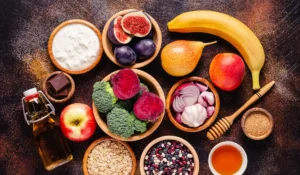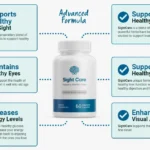Gut-Healing Foods: Do you struggle with constant bloating, irregular digestion, and unexplained food sensitivities? You’re not alone. My experience as a nutritionist showed me countless patients who battled these same gut health issues before I faced my own digestive challenges.
The right gut-healing foods changed my digestive health when nothing else worked. These powerful foods – from probiotic-rich fermented vegetables to anti-inflammatory herbs – helped repair my gut and restored my wellness naturally. The right combination of gut-healing foods supports your body’s natural healing processes and improves overall gut health.
In this piece, you’ll find the exact gut-healing diet that solved my digestive problems. I’ll share practical strategies to add these gut healing foods to your daily routine. These foods could be the solution you’ve been looking for, whether you have minor digestive discomfort or chronic gut issues.

My Gut Health Crisis: How It All Started
My experience with gut healing foods started like many other health professionals – I ignored important warning signs. What began as occasional digestive problems turned into something more serious.
Early warning signs I ignored
The first red flags seemed minor at first. These symptoms grew to include:
- Unexplained food intolerances
- Chronic fatigue and brain fog
- Persistent bloating and gas
- Irregular sleep patterns
- Unexpected mood changes
These symptoms weren’t random. They pointed to gut dysbiosis, where harmful bacteria take over the beneficial ones in your digestive system.
Breaking point that led to change
Everything changed during a really tough time. My digestive system completely shut down, and I couldn’t eat anything without intense pain. I developed several food sensitivities, and my energy dropped so much that I could barely stay awake after meals.
Original steps toward healing
I started researching gut healing foods and natural ways to fix my digestive health. Tests showed I had developed Small Intestinal Bacterial Overgrowth (SIBO). This condition and increased intestinal permeability explained why even healthy foods caused reactions.
My healing began when I identified trigger foods and understood the gut-brain connection. I learned that gut health affects not just digestion but also mood, immunity, and overall well-being. This knowledge helped me create a targeted gut healing diet that reshaped my health completely.
The Gut-Healing Foods That Changed Everything
Let me share the gut healing foods that changed my digestive health. These foods work together and help your body heal naturally.
Power of fermented foods
A good gut healing diet begins with probiotic-rich fermented foods. These gut health foods have beneficial bacteria that support digestive wellness. Here are the best fermented foods that help heal your gut:
- Kefir: Contains up to 850 million CFUs of beneficial bacteria
- Sauerkraut: Rich in fiber, vitamins C and K
- Kimchi: Helps lower inflammation markers
- Kombucha: Packed with antioxidants and good bacteria
Healing herbs and spices
Some herbs and spices are vital gut healing foods. Turmeric contains curcumin that reduces intestinal inflammation. Ginger root helps digestion by stimulating enzyme production. Cinnamon supports digestive enzyme production and helps regulate blood sugar.
Anti-inflammatory superfoods
Anti-inflammatory foods play a vital role in healing gut health naturally. The best gut healing foods in this category include:
Deeply colored berries provide potent polyphenols that reduce inflammatory markers in your blood. Extra-virgin olive oil, avocados, and wild fatty fish contain anti-inflammatory fats that support gut healing. Complex carbohydrates in whole grains like quinoa and buckwheat provide essential fiber for gut health.
You can maximize benefits by combining these gut healthy foods throughout your day. Research shows that eating six servings of fermented foods daily reduces inflammatory markers by a lot while increasing healthy gut microbiome diversity.
Creating My Personal Gut Healing Protocol
Finding the most effective gut healing foods led to the creation of a structured protocol. A strategic approach maximizes their benefits rather than random consumption of these foods.
Food combination strategies
The right food combinations help optimize your gut healing diet. Protein-rich foods digest better with non-starchy vegetables. Healthy fats paired with vegetables help boost nutrient absorption. Your meals should include these combinations to support optimal digestion and nutrient uptake.
Meal timing discoveries
Your gut healing foods’ timing is a vital part of digestive health. Studies show that eating meals within a consistent 8-12 hour window each day helps optimize metabolism and gut health. Here’s an optimal eating schedule:
- Breakfast: Within 2 hours of waking
- Lunch: Between 1:00-2:00 PM
- Dinner: Around 6:30 PM
Supplementation support
These essential supplements can boost your gut healing protocol:
- L-Glutamine: 15-45g daily for at least five days
- Zinc Carnosine: Up to 30mg daily
- Probiotics: Focus on a variety of strains including Lactobacillus and Bifidobacterium
- Digestive Enzymes: Take with meals to support the breakdown of proteins, fats, and carbohydrates
Space your supplements throughout the day instead of taking them all at once. To cite an instance, digestive enzymes work best with meals, while probiotics show better results on an empty stomach.
Note that healing gut health naturally takes patience and consistency. A well-laid-out approach to food combinations, meal timing, and supplementation helps support your body’s natural healing processes effectively.
Beyond Food: Lifestyle Changes for Gut Health
Your food choices can naturally heal your gut health, but lifestyle factors determine your healing success. The gut responds to more than just healing foods.
Stress management techniques
Your gut microbiome balance can get disrupted by chronic stress in just two days. Stress releases cortisol, which can lead to intestinal permeability problems and inflammation. These science-backed stress reduction techniques support your gut healing diet:
- Deep breathing exercises
- Mindfulness meditation
- Journaling
- Spending 20 minutes in nature daily
- Regular relaxation practices
Sleep optimization
Quality sleep plays a vital role in your gut healing protocol. Poor sleep can change your gut bacteria composition and increase inflammation. Your sleep quality and gut health foods work better when you:
- Maintain consistent sleep-wake times
- Create a pitch-black sleeping environment
- Stop eating 3 hours before bedtime
- Get morning sunlight exposure
Movement and exercise effects
Exercise benefits your gut microbiome significantly. Research shows that 30-90 minutes of moderate to high-intensity exercise at least three times weekly for 8+ weeks can change gut bacteria positively. Even low-intensity movement helps by reducing transit time in your digestive tract.
Exercise increases beneficial gut bacteria that produce short-chain fatty acids. These fatty acids help maintain gut barrier function. A mix of these activities enhances your gut healing foods’ benefits:
| Activity Type | Frequency | Duration |
|---|---|---|
| Aerobic Exercise | 3-5x/week | 30-60 min |
| Resistance Training | 2-3x/week | 20-30 min |
| Light Movement | Daily | Throughout day |
[Note: Always start at your current fitness level and gradually increase intensity]
Conclusion
Gut healing foods revolutionized my life as a nutritionist and could do the same for you. Scientific evidence shows that certain foods support your body’s natural healing abilities – from probiotic-rich ferments to anti-inflammatory superfoods. A complete approach determines success, though gut healing foods are the foundations.
Your gut healing experience needs patience and dedication. The process begins with daily fermented foods, followed by healing herbs and anti-inflammatory ingredients. The timing of your meals matters substantially. You can maximize the gut-healing potential by spacing meals properly and combining foods strategically.
Lifestyle modifications magnify the benefits of gut healing foods. Your digestive system heals better with quality sleep, stress management, and regular movement. Your body’s signals matter most – adjust the approach based on how you feel.
My personal transformation and countless patient success stories prove one clear truth – digestive health affects every aspect of wellbeing. These proven strategies and healing foods give you the tools to take control of your gut health naturally.
FAQs
Q1. What are some effective gut-healing foods? Some of the most effective gut-healing foods include fermented products like kefir, sauerkraut, and kimchi, which are rich in probiotics. Anti-inflammatory foods such as berries, olive oil, and fatty fish also support gut health. Additionally, herbs and spices like turmeric, ginger, and cinnamon can aid in digestion and reduce inflammation.
Q2. How long does it take to heal the gut with diet changes? Healing the gut through dietary changes is a gradual process that varies for each individual. While some people may notice improvements within a few weeks, it often takes several months of consistent dietary and lifestyle changes to achieve significant gut healing. Patience and persistence are key in this journey.
Q3. Can lifestyle factors impact gut health? Yes, lifestyle factors play a crucial role in gut health. Stress management techniques, quality sleep, and regular exercise can significantly impact your gut microbiome. For instance, chronic stress can disrupt gut balance in as little as two days, while regular exercise can positively modify gut bacteria in 8+ weeks.
Q4. Are supplements necessary for gut healing? While a balanced diet is fundamental, certain supplements can support gut healing. L-Glutamine, Zinc Carnosine, probiotics, and digestive enzymes are often recommended. However, it’s important to consult with a healthcare professional before starting any supplement regimen, as individual needs may vary.
Q5. How does meal timing affect gut health? Meal timing can significantly impact gut health. Consuming meals within a consistent 8-12 hour window each day can optimize metabolism and gut function. It’s generally recommended to have breakfast within 2 hours of waking, lunch between 1:00-2:00 PM, and dinner around 6:30 PM. This schedule allows for proper digestion and supports the body’s natural rhythms.
Gut-Healing Foods Gut-Healing Foods Gut-Healing Foods
